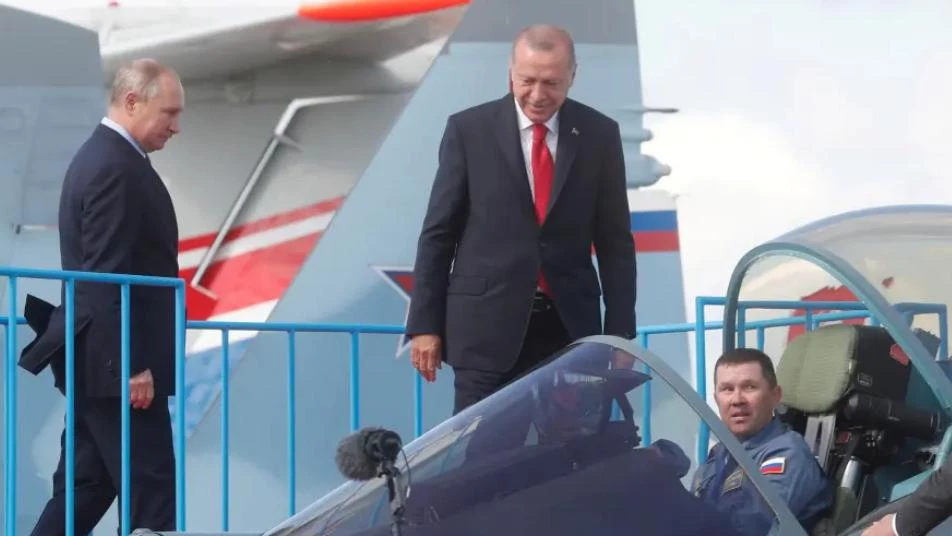Russia appears to be the key broker in both places, so Turkey may need to buy Russian aircraft to get what it wants in Syria. Or it could be that Russia may now need Turkey more than it cares about northern Syria. This is the complex needle that is being thread in Moscow.
Erdogan was all smiles with Russian president Vladimir Putin as they discussed Turkey buying Russian-made Su-35 and Su-57 fighter jets. There was a moment of levity when the Turkish leader asked if the S-57 can fly. Ankara wants these aircraft to replace the F-35 which Turkey appears unlikely to get after it decided to buy Russia’s S-400 air defense system in 2017. It took delivery of the first parts of the system this summer, and by April next year the system could be operational. Ironically,
Turkey’s only real adversary in the last ten years has been Russia’s backing of the Syrian regime. Remember when a Turkish Air Force F-16 jet shot down a Russian Sukhoi Su-24 in 2015? All forgotten now.
Russia is pleased with these developments. Moscow’s Tass media had several stories about Turkey on its homepage on Thursday. One of them clearly showed the brinkmanship Ankara is playing. “The Turkish president added that the decision would be made after he learns the final US word on Turkey’s participation in the F-35 program.” Tass reports that Turkey will use cooperation with Russia to put pressure on the US. “Turkey’s plans to boost defense cooperation with Russia are an additional factor of pressure on the Americans to make them more willing to resolve issues concerning a safety zone in northeastern Syria,” according to Vladiir Fitin, head of the Russian Institute for Strategic Studies Center.
Turkey’s strategy is as transparent as it is complex. On the one hand, Turkey has observation posts in northern Syria; it doesn’t want the security situation to erode more. However, by August 1 more than 450,000 in Idlib had been displaced by fighting. Today the number has increased by 70,000, while Turkish media says 750,000 have been displaced since last September.
The mood in Turkey is also changing regarding the millions of Syrians who fled Syria and became refugees in Turkey. Once hosted with open arms, there are articles saying they can’t stay forever. Turkey’s foreign ministry says 340,000 have returned – to areas Ankara says it “cleared” in Operation Euphrates shield and Olive Branch. The latter saw the takeover of Afrin, a peaceful, mostly Kurdish area in northwest Syria.
So this is the complex calculation that is taking place in northern Syria. The more the Iranian and Russian-backed Syrian regime attacks, the more Syrians flee toward Turkey. Yet Ankara wants the refugees to go back. This creates a kind of sandwich between Turkey’s border: the Syrian areas that Turkey now controls, and the Syrian regime. Russia must be judicious in how much support it gives the regime because, if the area explodes into violence, then Turkey’s desire to use the S-400 against the Americans to pressure the US for another deal will be ruined by war in northern Syria.
So Turkey and Russia must agree on northern Syria, while Ankara uses Moscow as a pressure point against Washington. What’s the pressure that Turkey hopes to achieve with the US? Turkey has condemned America for backing the Syrian Democratic Forces (SDF), the main partner of the US-led coalition against ISIS. Turkey claims that the SDF is linked to the Kurdish People’s Protection Units (YPG) – which is linked to the Kurdistan Workers Party (PKK) – and therefore Turkey sees them all as terrorists.
The US doesn’t agree. It sees the PKK as a terrorist group – and has put bounties on its leaders, but not those of the others. The US doesn’t want a Turkish offensive into northern Syria, because it wants stability. Turkey says it requires a “safe zone” in the areas now held by the SDF and backed by the US. So Washington set up a “security mechanism” earlier this month after Ankara’s threats. Now rumors indicate that Turkey might walk back its demand for a 30 km. deep safe zone for something smaller. The idea is to get America to agree to something, and maybe ask for more later.
The US has been angry at Turkey over buying Russia’s S-400, saying that it can’t have both the S-400 and the F-35. Turkey appears in a good position here, being able to get Washington and Moscow to bid for its affections. But Ankara may be permanently harming some support in Washington, as the US House Foreign Affairs Committee called for US President Donald Trump to sanction Turkey.
But the statement also said that Turkey’s interests are best served by a partnership with the US. Turkey’s Russian relations harm its connections to both US Republicans and Democrats; the latter are angry about claims of Russian interference in US elections, while support for the SDF crosses party lines.
But the US is transparent about what it wants. The new US Defense Secretary, Mark Esper, says he hopes that Turkey will abandon the S-400.
In the coming days several things will happen. There will be more progress on the “safe zone” and there will be an attempt to reduce the Syrian offensive in northern Syria. Russia obviously wants the partnership with Turkey to grow. It can rein in the Syrian regime, or use the offensive to pressure Turkey. The whole Turkey-Russia-Syria-US-SDF situation is one complex web where each string attaches to all the others. Pull-on one and the whole system is affected.
These are ramifications for the whole region as well. Turkey will meet with the Iranians and Russians in September to talk about Syria. Turkey is a key ally of Qatar and this overshadows the Gulf, as well as Turkey’s historic relationship with Hamas in Gaza.



التعليقات (0)